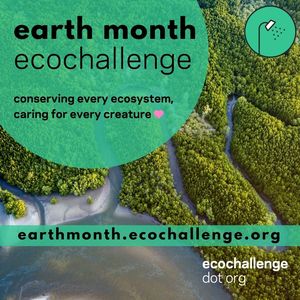Anu Pillai
"Our mission is to inspire and empower individuals and communities to take meaningful action towards creating a sustainable and regenerative world. Through education, engagement, and collaboration, we aim to foster a global culture of environmental stewardship, where every individual recognizes their role in preserving the planet for future generations. By challenging ourselves to make conscious choices and adopt eco-friendly habits, we strive to promote environmental awareness, reduce our ecological footprint, and build a more resilient and harmonious relationship between humanity and the natural world."
POINTS TOTAL
- 0 TODAY
- 0 THIS WEEK
- 1,060 TOTAL
participant impact
-
UP TO169milesnot traveled by car
-
UP TO169milestraveled by bus
-
UP TO2.2pounds of CO2have been saved
-
UP TO245pieces of litterpicked up
-
UP TO1.0waste auditconducted
-
UP TO1.0water footprintcalculated
-
UP TO0.0public officials or leaderscontacted
-
UP TO1.0community eventhosted or attended
-
UP TO0.0advocacy actionscompleted
-
UP TO30minutesspent outdoors
-
UP TO2.0treesplanted
-
UP TO365minutesspent learning
Anu's actions
Climate + Air
Declutter My Home Without the Landfill
Each day, I will learn about responsible ways to dispose of items and de-clutter, clean, donate, repurpose or recycle unneeded items in my home to make sure that what I get rid of doesn't go into the landfill.
Climate + Air
Use Public Transit
Public transportation reduces pollution, improves community, and creates safe streets. I will use public transit 60 miles per day and avoid sending up to (___) lbs of CO2 into Earth's atmosphere.
Biodiversity + Wildlife
Beauty and Personal Products
Beauty and personal products can create a lot of waste. I will spend 10 minutes learning about the beauty and body products I use to see if they are refillable or recyclable. If not, I will reach out to the manufacturer to advocate for those options.
Climate + Air
Choose Renewable Energy
Renewable energy options are becoming more widespread and accessible. Not only are they good for the planet, they can help save money as well. I will sign up for my utility company's clean/renewable energy option. If my utility does not offer one, I will contact them to advocate for this option in the future.
Climate + Air
Consume only Needs vs Wants
The more stuff we consume, the more greenhouse gasses we put into the atmosphere. I will adopt a "Needs Vs. Wants" approach this month and only buy things I need.
Land + Forests
Personal Waste Audit
The waste we create daily can go unnoticed. I will track the waste I create in a day and post a photo log on the feed to see how much I create and where I can make different choices to reduce my waste going forward.
Freshwater + Oceans
Low Water Gardening
Grass lawns are water-intensive and on average require about 30 percent of a household’s water consumption. Native plants are water-efficient and help maintain the balance and diversity of local ecosystems. I will plant native species with water-efficient plants to conserve water and improve the habitat, then post a photo on the feed to share.
Freshwater + Oceans
Join a Cleanup Effort
I will organize or participate in a trash pickup at a local river, beach, or natural body of water.
Freshwater + Oceans
Understand My Water Footprint
Each of us has a water footprint, directly linked to our daily activities as well as the water required in the production of things we use each day. Understanding our water use is important for a healthy planet. I will calculate my water footprint and look for a few ways I can reduce consumption or waste, then share what I learned on the feed.
Freshwater + Oceans
Reduce Pollutants in Cleaning
Understanding cleaning product ingredients and their effect on water and biodiversity is helpful to our consumer choices. I will spend 10 minutes learning about how cleaning products affect our water and try making my own cleaning products to reduce pollutants.
Land + Forests
Zero Waste Day
The impacts of our waste are far reaching. I will create zero waste for an entire day and share my reflections and learnings on the feed.
Land + Forests
Choose Eco-Friendly Wood and Paper
Trees provide food and habitat for local wildlife species, shade our streets and homes, and help keep our air and water clean by capturing pollutants. Buying products that help protect forests makes a difference. I will only purchase wood, furniture, and paper products from ecologically certified sources such as Forest Stewardship Council.
Land + Forests
Explore My Area
When we explore natural spaces around us, our connections with them change. I will spend 15 minutes exploring a new area around my neighborhood, office, or campus (e.g., park, water body, nearby trail, community garden, green space, etc.).
Land + Forests
Advocate for Forest Protection
Using my voice can help create a more sustainable and just world. I will contact 1 local, regional, or national decision makers to advocate for public policy that protects forests and improves their ability to sequester carbon and nourish biodiversity.
Action Track: Community
Borrow Before I Buy
Why buy something I will only use once or a few times if someone nearby has it for me to borrow, and why not share something I have that someone may only need a few times a year? To reduce my consumption and waste, I will create or support the sharing economy with friends, family, colleagues or neighbors.
Land + Forests
Regenerative Agriculture and Me
Regenerative agriculture focuses on farming and ranching in a way that supports life and restores the soil. I will spend 1 minutes learning about regenerative agriculture and find out if any nearby farms practice regenerative agriculture.
Biodiversity + Wildlife
Plastic in Clothing and Water
Synthetic clothing can contain plastic and shed harmful microplastics into our water. I will use a microplastics catcher in my laundry, or install a microplastics filter for my washing machine.
Biodiversity + Wildlife
Seek Alternative Gifts and Souvenirs
When traveling, I will seek souvenirs that support local communities and do not cause harm to the environment or wildlife.
Biodiversity + Wildlife
Endangered Species
Wildlife and biodiversity play an important role on our planet and are being threatened each year. I will spend 5 minutes each day learning about the current status of local or global wildlife and how I can align my actions to support their livelihood.
Biodiversity + Wildlife
Leave No Trace
I will respect and protect biotic communities by practicing the seven principles of Leave No Trace whenever I am outside.
Land + Forests
Keep My Community Clean
At times it may not feel like it's up to us to keep our community clean and healthy, but we all have a role to play. Each day I am outside, I will pick up any litter I see.
Land + Forests
Plant Trees
Trees capture carbon and produce oxygen that is essential to life on earth. I will support this important piece of nature by organizing or joining a community group to plant 2 native trees in my community, public parks, office location, campus or backyard.
Freshwater + Oceans
Smart Seafood Choices
We need to support healthy seafood populations. I will spend 10 minutes learning about sustainable seafood choices, commit to making better seafood choices for a healthier ocean, and share what I learned on the feed.
Action Track: Community
JOIN OR CREATE A GREEN TEAM AT EMERSON
I will continue to contribute to Emerson's environmental sustainability goals beyond April by learning more about the Global Green Teams Network, joining a team near me, or maybe even creating a new team.
Action Track: Community
TAKE PICTURES AND SHARE ON LINKEDIN
I will take at least one photograph that is connected with this year's theme of Nature Conservation & Biodiversity (for example an urban park, bee hives, birds and other animals...) and I will post it on LinkedIn with the hashtags #EarthMonthEcochallenge #EarthMonthAtEmerson.
Participant Feed
Reflection, encouragement, and relationship building are all important aspects of getting a new habit to stick.
Share thoughts, encourage others, and reinforce positive new habits on the Feed.
To get started, share “your why.” Why did you join the challenge and choose the actions you did?
-
 Anu Pillai 4/30/2024 9:38 PMRemember the lessons from our eco month challenge; it's time to put them into practice.
Anu Pillai 4/30/2024 9:38 PMRemember the lessons from our eco month challenge; it's time to put them into practice. -
 Anu Pillai 4/29/2024 6:25 PMLet's keep in mind that we should treat every day like Earth Day.
Anu Pillai 4/29/2024 6:25 PMLet's keep in mind that we should treat every day like Earth Day.-
 Anu dheebha 4/29/2024 6:32 PMYes
Anu dheebha 4/29/2024 6:32 PMYes -
 Elaine Zang 4/29/2024 6:26 PMYes !
Elaine Zang 4/29/2024 6:26 PMYes !
-
-
 Anu Pillai 4/28/2024 9:37 PMThe Earth is what we all have in common.
Anu Pillai 4/28/2024 9:37 PMThe Earth is what we all have in common.-
 Saloni Dhruve 4/29/2024 2:38 AMabsolutely
Saloni Dhruve 4/29/2024 2:38 AMabsolutely
-
-
 Anu Pillai 4/27/2024 10:18 PM
Anu Pillai 4/27/2024 10:18 PM
5 REASONS TO SWITCH TO LEDLEDs Have a Long LifespanOne of the best selling points of LED bulbs is their exceptional life span. While the longevity of an LED is dependent on the design and brand of the bulb, it is generally accepted that an LED bulb will offer light anywhere from 15 000 to 30 000 hours. This is a generous life span in comparison to regular incandescent bulbs which only offer up to 2 000 hours of light. It also means that you will have to swap out burnt-out bulbs less often, saving you time and money.
LEDs Cause Less Light PollutionOne of the lesser-known benefits of LEDs is that they almost eliminate light pollution. The light emitted from LED bulbs is inherently directional and only focuses where it is required. There is a defined beam angle and very little of the illumination is wasted like it is with other light bulbs.
LEDs Are More Environmentally FriendlyUnlike other energy-saving options on the market, LED bulbs do not contain mercury vapour which is harmful to the environment. They’re also manufactured using recyclable materials so you can take them to your local recycler.
LEDs are Energy EfficientA comparison between LEDs and incandescent, fluorescent, and halogen bulbs, shows a great difference in the amount of energy produced. Incandescent, fluorescent, and halogen bulbs produce 10% light and 90% heat, while LEDs produce 95% light and only 5% heat. This means that a much lower wattage is required to get the same amount of light. The result is a reduction in your energy consumption - great for both the environment and your electricity bill.
LEDs Are Better For Your HealthThe quality of light produced by LED bulbs can have a positive impact on your health and overall well-being. Unlike fluorescent bulbs, they don’t flicker so won’t cause headaches and eye strain. The latest LED technology also effectively mimics natural light which promotes a healthier circadian rhythm, leading to better sleep at night and reducing anxiety.
-
Vijay Jawade 4/30/2024 2:10 AMThanks. I saw some lights in my rental house having opportunity to replace with LED's -
 Megha Gola 4/27/2024 11:26 PMGood information
Megha Gola 4/27/2024 11:26 PMGood information
-
-
REFLECTION QUESTIONLand + Forests Advocate for Forest ProtectionHigher standards of living are very often dependent on moving our environmental costs elsewhere. What are some specific ways in which the environmental impacts of your own lifestyle might be shifted elsewhere?
 Anu Pillai 4/27/2024 9:42 AMReflecting on my lifestyle, I recognize several ways in which the environmental impacts might be shifted elsewhere:Consumption habits: Opting for products that are cheaply manufactured in countries with lax environmental regulations can shift the environmental burden to those regions. This includes goods produced with high carbon emissions or pollutants, as well as those associated with deforestation or habitat destruction.Waste disposal: Discarding items without considering their environmental impact can shift the burden to waste management systems, which may result in pollution, habitat degradation, or greenhouse gas emissions from landfills or incineration.Energy consumption: Reliance on energy sources with significant environmental costs, such as fossil fuels, can shift the burden to communities near extraction sites or power plants, leading to air and water pollution, habitat destruction, and health impacts.Transportation: Choosing modes of transportation with high carbon emissions, such as driving long distances alone or using air travel frequently, can shift the environmental burden to the atmosphere, contributing to climate change and its associated impacts.To address these issues, I can take proactive steps to minimize the environmental impacts of my lifestyle. This includes prioritizing sustainable and ethically produced goods, reducing waste through recycling and composting, minimizing energy consumption, and opting for low-carbon transportation options whenever possible. By being mindful of the broader environmental consequences of my actions, I can strive to minimize the shifting of environmental costs elsewhere and promote more responsible and sustainable living.
Anu Pillai 4/27/2024 9:42 AMReflecting on my lifestyle, I recognize several ways in which the environmental impacts might be shifted elsewhere:Consumption habits: Opting for products that are cheaply manufactured in countries with lax environmental regulations can shift the environmental burden to those regions. This includes goods produced with high carbon emissions or pollutants, as well as those associated with deforestation or habitat destruction.Waste disposal: Discarding items without considering their environmental impact can shift the burden to waste management systems, which may result in pollution, habitat degradation, or greenhouse gas emissions from landfills or incineration.Energy consumption: Reliance on energy sources with significant environmental costs, such as fossil fuels, can shift the burden to communities near extraction sites or power plants, leading to air and water pollution, habitat destruction, and health impacts.Transportation: Choosing modes of transportation with high carbon emissions, such as driving long distances alone or using air travel frequently, can shift the environmental burden to the atmosphere, contributing to climate change and its associated impacts.To address these issues, I can take proactive steps to minimize the environmental impacts of my lifestyle. This includes prioritizing sustainable and ethically produced goods, reducing waste through recycling and composting, minimizing energy consumption, and opting for low-carbon transportation options whenever possible. By being mindful of the broader environmental consequences of my actions, I can strive to minimize the shifting of environmental costs elsewhere and promote more responsible and sustainable living.-
 AKHIL MANDALAPU 4/27/2024 9:53 AMGood Informative!!
AKHIL MANDALAPU 4/27/2024 9:53 AMGood Informative!!
-
-
REFLECTION QUESTIONLand + Forests Explore My AreaWhere did you go for your walk or hike in nature? What were the benefits of doing so?
 Anu Pillai 4/27/2024 9:40 AMRecently we went for a hiking near sharjah. The physical activity of hiking provided a great workout for my body, improving my cardiovascular health and boosting my mood through the release of endorphins. The varied terrain and elevation changes also challenged my muscles and coordination, contributing to my overall fitness.
Anu Pillai 4/27/2024 9:40 AMRecently we went for a hiking near sharjah. The physical activity of hiking provided a great workout for my body, improving my cardiovascular health and boosting my mood through the release of endorphins. The varied terrain and elevation changes also challenged my muscles and coordination, contributing to my overall fitness.-
 AKHIL MANDALAPU 4/27/2024 9:54 AMThat's Great!!
AKHIL MANDALAPU 4/27/2024 9:54 AMThat's Great!!
-
-
REFLECTION QUESTIONLand + Forests Choose Eco-Friendly Wood and PaperBeyond carbon sequestration, what other benefits do forests offer you personally?
 Anu Pillai 4/27/2024 9:33 AMBeyond carbon sequestration, forests offer me a multitude of personal benefits.Firstly, spending time in forests has a profound positive impact on my mental and physical well-being. The beauty of nature found in forests provide a natural remedy for stress and anxiety, allowing me to recharge and reconnect with myself.Moreover, forests offer recreational opportunities such as hiking, camping, and birdwatching, which I enjoy immensely. These activities allow me to immerse myself in nature, explore new places, and appreciate the diverse flora and fauna that call forests home.Forests also play a crucial role in supporting biodiversity, providing habitats for countless species of plants and animals.Knowing that forests harbor such rich biodiversity fills me with awe and appreciation for the natural world.Forests contribute to the quality of the air and water, filtering pollutants and regulating local climates. Breathing in the fresh, clean air of a forest and drinking from its pristine streams is a privilege I cherish deeply.Overall, forests offer me a sanctuary for relaxation, a playground for adventure, and a source of inspiration and wonder. Their value to me extends far beyond their role in carbon sequestration, making them an indispensable part of my life and well-being.
Anu Pillai 4/27/2024 9:33 AMBeyond carbon sequestration, forests offer me a multitude of personal benefits.Firstly, spending time in forests has a profound positive impact on my mental and physical well-being. The beauty of nature found in forests provide a natural remedy for stress and anxiety, allowing me to recharge and reconnect with myself.Moreover, forests offer recreational opportunities such as hiking, camping, and birdwatching, which I enjoy immensely. These activities allow me to immerse myself in nature, explore new places, and appreciate the diverse flora and fauna that call forests home.Forests also play a crucial role in supporting biodiversity, providing habitats for countless species of plants and animals.Knowing that forests harbor such rich biodiversity fills me with awe and appreciation for the natural world.Forests contribute to the quality of the air and water, filtering pollutants and regulating local climates. Breathing in the fresh, clean air of a forest and drinking from its pristine streams is a privilege I cherish deeply.Overall, forests offer me a sanctuary for relaxation, a playground for adventure, and a source of inspiration and wonder. Their value to me extends far beyond their role in carbon sequestration, making them an indispensable part of my life and well-being.-
 Abeesh Paul 4/30/2024 6:56 AMGood one
Abeesh Paul 4/30/2024 6:56 AMGood one -
 AKHIL MANDALAPU 4/27/2024 9:58 AMGood Informative
AKHIL MANDALAPU 4/27/2024 9:58 AMGood Informative -
 LITTY PHILIP 4/27/2024 9:40 AMI echo that.
LITTY PHILIP 4/27/2024 9:40 AMI echo that. -
 LITTY PHILIP 4/27/2024 9:40 AMI echo that.
LITTY PHILIP 4/27/2024 9:40 AMI echo that.
-
-
REFLECTION QUESTIONLand + Forests Zero Waste DayWhat was hard about having a Zero Waste Day? What did you learn about yourself and your habits?
 Anu Pillai 4/27/2024 9:30 AMHaving a Zero Waste Day definitely had its challenges, especially when it came to avoiding single-use plastics and packaging. I found it difficult to navigate grocery stores and restaurants without generating any waste, as so many products come wrapped in plastic or other non-recyclable materials. It required careful planning and creativity to find alternatives and make sustainable choices throughout the day.Through this experience, I learned a lot about my habits and the areas where I can improve. I realized just how much waste I produce on a daily basis without even thinking about it, from disposable coffee cups to plastic packaging from online orders. It made me more mindful of my consumption habits and motivated me to seek out eco-friendly alternatives and reduce my overall waste footprint. While it was challenging, it was also eye-opening and inspiring to see how small changes can make a big difference in reducing waste and living more sustainably.
Anu Pillai 4/27/2024 9:30 AMHaving a Zero Waste Day definitely had its challenges, especially when it came to avoiding single-use plastics and packaging. I found it difficult to navigate grocery stores and restaurants without generating any waste, as so many products come wrapped in plastic or other non-recyclable materials. It required careful planning and creativity to find alternatives and make sustainable choices throughout the day.Through this experience, I learned a lot about my habits and the areas where I can improve. I realized just how much waste I produce on a daily basis without even thinking about it, from disposable coffee cups to plastic packaging from online orders. It made me more mindful of my consumption habits and motivated me to seek out eco-friendly alternatives and reduce my overall waste footprint. While it was challenging, it was also eye-opening and inspiring to see how small changes can make a big difference in reducing waste and living more sustainably. -
REFLECTION QUESTIONLand + Forests Regenerative Agriculture and MeWhat did you learn about the practice and benefits of regenerative agriculture? How can you support healthy farming practices for people and the planet?
 Anu Pillai 4/27/2024 9:29 AMThrough my research, I've learned about the practice and benefits of regenerative agriculture, which focuses on improving soil health, enhancing biodiversity, and sequestering carbon to mitigate climate change. Regenerative agriculture promotes techniques such as minimal tillage, crop rotation, cover cropping, and the use of natural fertilizers to regenerate degraded soil and restore ecosystem balance.To support healthy farming practices for people and the planet, I can take several actions:
Anu Pillai 4/27/2024 9:29 AMThrough my research, I've learned about the practice and benefits of regenerative agriculture, which focuses on improving soil health, enhancing biodiversity, and sequestering carbon to mitigate climate change. Regenerative agriculture promotes techniques such as minimal tillage, crop rotation, cover cropping, and the use of natural fertilizers to regenerate degraded soil and restore ecosystem balance.To support healthy farming practices for people and the planet, I can take several actions:- Choose regeneratively grown products: I can support farmers who practice regenerative agriculture by purchasing products labeled as such, including fruits, vegetables, grains, and meat.
- Advocate for sustainable agriculture policies: I can advocate for policies that incentivize and support regenerative farming practices at local, national, and global levels.
- Educate others: I can raise awareness about the importance of regenerative agriculture and its benefits for the environment, human health, and rural communities.
- Reduce food waste: By minimizing food waste and supporting initiatives that redistribute surplus food to those in need, I can help reduce the environmental impact of food production.
- Grow my own food: If possible, I can grow my own fruits and vegetables using regenerative gardening practices, such as composting and mulching, to improve soil health and promote biodiversity in my own backyard.
By supporting regenerative agriculture, we can contribute to a more sustainable and resilient food system that benefits both people and the planet. -
REFLECTION QUESTIONFreshwater + Oceans Reduce Pollutants in CleaningWhat did you learn about ingredients in our cleaning products and how they impact water and biodiversity? Did you try making your own cleaning products? If so, how did it go?
 Anu Pillai 4/27/2024 9:27 AMI've learned that many ingredients commonly found in cleaning products can have significant impacts on water quality and biodiversity. For example, certain chemicals like phosphates and chlorine can contribute to water pollution, harming aquatic ecosystems and wildlife. Additionally, surfactants and synthetic fragrances can accumulate in waterways, disrupting natural processes and affecting the health of aquatic organisms.To mitigate these impacts, I'm focusing on using environmentally friendly cleaning products with biodegradable ingredients. By choosing products that are free from harmful chemicals and toxins, I can help protect water quality and biodiversity while maintaining a clean and healthy home. Additionally, I'm exploring homemade cleaning solutions using natural ingredients like vinegar, baking soda, and essential oils, which are safer for both the environment and my family.
Anu Pillai 4/27/2024 9:27 AMI've learned that many ingredients commonly found in cleaning products can have significant impacts on water quality and biodiversity. For example, certain chemicals like phosphates and chlorine can contribute to water pollution, harming aquatic ecosystems and wildlife. Additionally, surfactants and synthetic fragrances can accumulate in waterways, disrupting natural processes and affecting the health of aquatic organisms.To mitigate these impacts, I'm focusing on using environmentally friendly cleaning products with biodegradable ingredients. By choosing products that are free from harmful chemicals and toxins, I can help protect water quality and biodiversity while maintaining a clean and healthy home. Additionally, I'm exploring homemade cleaning solutions using natural ingredients like vinegar, baking soda, and essential oils, which are safer for both the environment and my family.